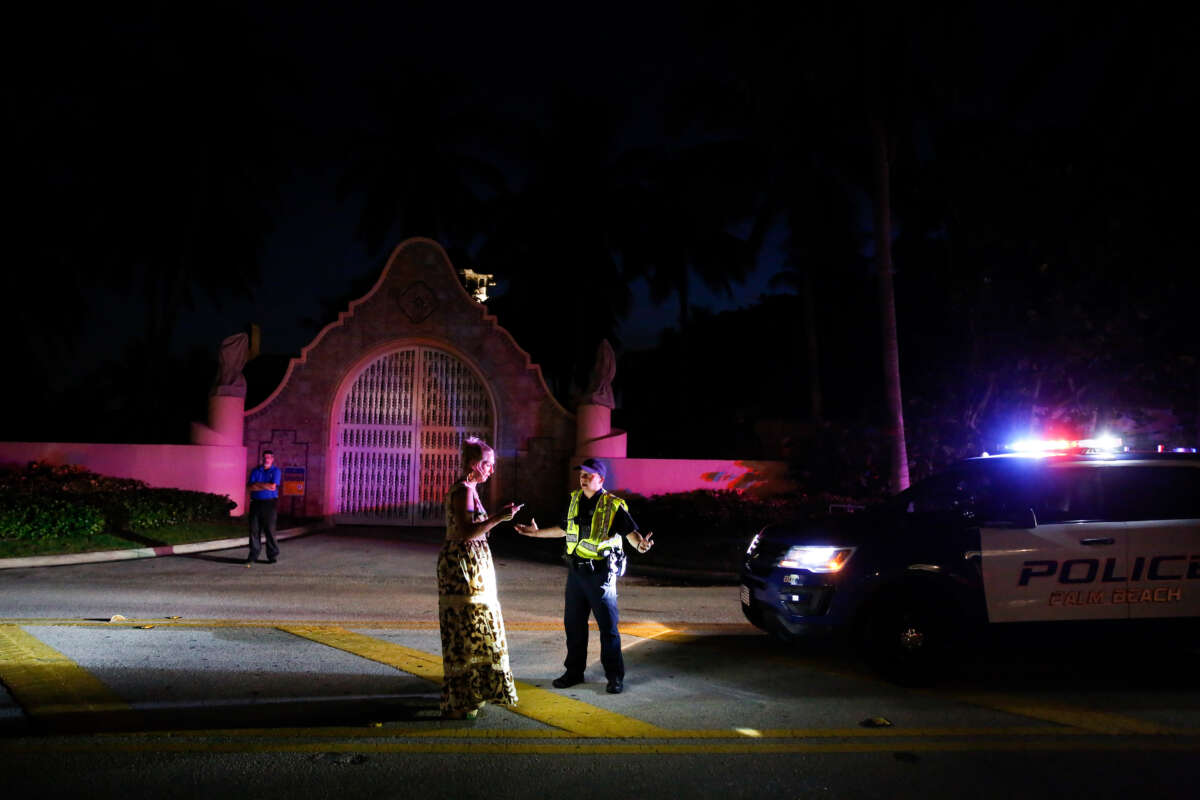Honest, paywall-free news is rare. Please support our boldly independent journalism with a donation of any size.
New reporting from The Washington Post details how the Department of Justice (DOJ) and the Federal Bureau of Investigation (FBI) came to the decision to search former President Donald Trump’s Mar-a-Lago residence for government documents earlier this year.
The search of the Palm Beach, Florida, property, which took place in August, yielded more than 13,000 government documents that Trump had removed from the White House after his departure from office — including 103 documents that were marked as classified.
Since Trump left the White House in January 2021, more than 300 classified documents have been retrieved from Mar-a-Lago by various government agencies.
The reporting from the Post reveals that FBI officials were initially wary about conducting the August search, as it would be an unprecedented action against a former president. The FBI was also concerned about Trump’s presence at Mar-a-Lago and the possibility that officials would have to physically move him out of the way if he refused to allow them to execute a search warrant on the property.
Those worries were alleviated after it became clear that Trump, who spends less time at Mar-a-Lago in the summer due to the heat, would likely be at one of his properties in New Jersey or New York City while the search was being conducted.
The Post’s reporting showcases that the FBI ultimately got involved after arm-twisting from another government agency.
The National Archives and Records Administration (NARA), well aware that Trump had removed government documents from the White House, was involved in discussions with Trump’s lawyers for several months in 2021 to get the documents back. Trump only relented after NARA threatened to involve Congress in the matter. In January, the agency retrieved around 15 boxes of documents from the property.
After that retrieval, the Post reported, NARA noted that some of the documents were classified and contacted the FBI. But FBI officials hesitated to take further action, claiming it didn’t matter that Trump had the records because the government still had copies. The agency only agreed to pursue the matter after NARA informed them that the issue could pose risks to national security, citing Trump’s communications with North Korean leader Kim Jong Un and documents regarding the nuclear weapon capabilities of a foreign nation.
The FBI reviewed the boxes NARA had taken in May, and engaged in conversations with Trump employees that “raised more alarms that the former president was, incredibly, still trying to hold onto classified documents and mislead the government,” the Post reported. A subpoena was executed in June to retrieve more materials.
In response to that subpoena, Trump lawyer Christina Bobb affirmed that a “diligent search” had been undertaken on the property, and that no additional classified documents remained. Over the course of the next several weeks, however, the FBI began to foster doubts about that statement.
The DOJ team serving the subpoena, for example, was not permitted to look inside containers where Trump’s boxes from the White House were kept. Mar-a-Lago employees also confided to the FBI that Trump had ordered them to move boxes from his storage locker to his private residence.
With more evidence mounting (including a surveillance video showing that boxes were indeed removed from the locker), the FBI concluded in July that Trump was likely still storing classified documents at Mar-a-Lago — an action that could warrant obstruction of justice, as Trump had previously denied that this was the case. The agency also speculated that Trump could be guilty of destroying government property, as it is well documented that Trump improperly disposed of records while he was president.
In order to discern whether or not the second charge was true, a search of the property was required, the agency concluded. But the FBI would only do so if Attorney General Merrick Garland signed off on the order, they told higher-ups at the DOJ. Senior DOJ officials agreed, and Garland eventually signed off on the order.
Days after the August search warrant was conducted, Garland made a public statement confirming that he had indeed authorized the search of the Trump-owned property. “The department does not take such a decision lightly,” Garland said at the time.
Trump has maintained since August that he has done nothing wrong and that he had previously declassified the documents — some with the designation of “top secret” — while he was in the White House. However, Trump has failed to produce evidence that any of the hundreds of documents he kept at Mar-a-Lago were declassified.
A terrifying moment. We appeal for your support.
In the last weeks, we have witnessed an authoritarian assault on communities in Minnesota and across the nation.
The need for truthful, grassroots reporting is urgent at this cataclysmic historical moment. Yet, Trump-aligned billionaires and other allies have taken over many legacy media outlets — the culmination of a decades-long campaign to place control of the narrative into the hands of the political right.
We refuse to let Trump’s blatant propaganda machine go unchecked. Untethered to corporate ownership or advertisers, Truthout remains fearless in our reporting and our determination to use journalism as a tool for justice.
But we need your help just to fund our basic expenses. Over 80 percent of Truthout’s funding comes from small individual donations from our community of readers, and over a third of our total budget is supported by recurring monthly donors.
Truthout has launched a fundraiser to add 460 new monthly donors in the next 8 days. Whether you can make a small monthly donation or a larger one-time gift, Truthout only works with your support.
